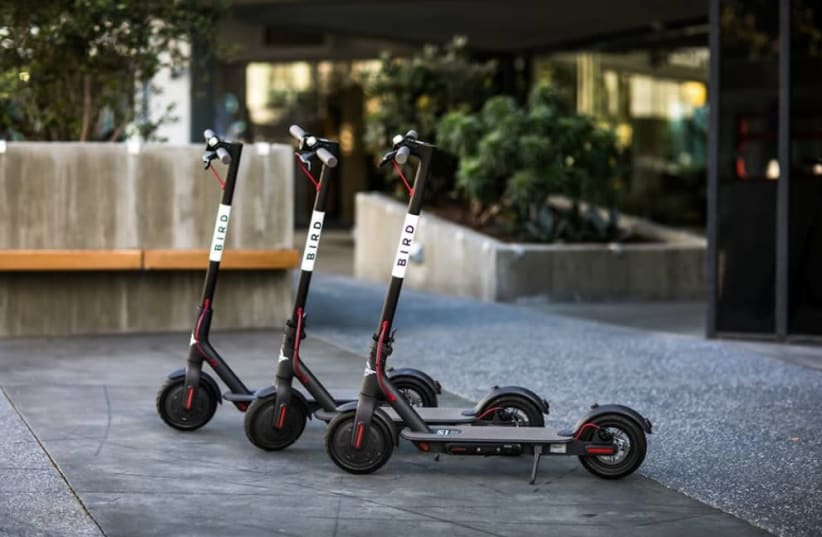New licensing regulations for operators of shared electric scooter and bicycle companies were published by the Tel Aviv Municipality on Monday, imposing limits on the number of vehicles on the city's streets and new parking regulations beginning August 1.
The municipality hopes the temporary, six-month licenses will ensure a fair balance between ensuring the safety of all the city's inhabitants and answering the demand for new means of transportation.
Today, electric scooter companies Bird, Lime, Wind and Leo, as well as the bicycle sharing firm Mobike and the municipality's own Tel-O-Fun service, all operate in the city. Under the new rules, each licensed company will be limited to a total fleet of 2,500 scooters or bicycles at any given time.
Initially, areas to the west of Ibn Gabirol Street will be designated as limited parking zones, with users only permitted to park shared scooters and bicycles in dedicated locations that do not interfere with pedestrian or vehicular traffic. The municipality says it will confiscate any vehicles parked outside of these areas.
The municipality will subsequently mark hundreds of dedicated parking locations throughout the city, and calls on users to park responsibly until the process is complete.
License holders must enable the rental and return of shared transportation options throughout the entire city, deploying a defined percentage of scooters or bicycles in "preferred areas" defined by the municipality, with an emphasis on Jaffa and locations currently affected by light rail construction work.
Companies will also be required to implement plans to increase the observance of traffic laws, including wearing a helmet, not riding on sidewalks, riding alone and minimum user age.
Additional regulations include preventing the use of horns between 11 p.m. and 7 a.m., and establishing customer service centers to assist users and serve as a channel of communication with the municipality regarding the maintenance of public order. Finally, permit holders will transfer data and other information to the municipality for urban research and analysis purposes.
"The integration of shared transportation in the city is welcomed, providing alternative green transportation that cuts congestion and air pollution, and reduces dependence on private vehicles," said Tel Aviv Deputy Mayor Meital Lehavi, responsible for transportation at the municipality.
"Alongside the advantages, challenges have also been created, primarily in terms of maintaining public order. We are required to provide a response that will ensure a balance between various needs, but first and foremost those of pedestrians on the sidewalks."
Since mid-May, the municipality has increased its enforcement efforts as it attempts to reduce the number of pedestrian injuries caused by shared electric scooters, bicycles and motorbikes traveling on sidewalks.
Working together with the Police, the municipality has handed out over 9,000 fines to scooter and bicycle users since January for traffic violations. Users caught riding on sidewalks can be given a NIS 250 ($70) penalty.
"The regulations formulated by the Tel Aviv municipality are balanced overall, and largely enable the continuation of the transportation revolution that Bird initiated last August," an Israeli representative of California-headquartered Bird said.
"As a company that has championed the reduction of road congestion and air pollution, we base supply on demand, so imposing quotas will reduce long-term confidence in the service. It should be noted that demand is already exceeding supply."
